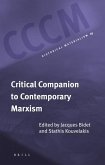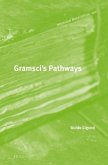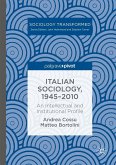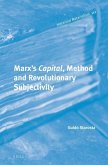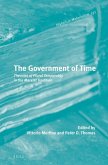- Gebundenes Buch
- Merkliste
- Auf die Merkliste
- Bewerten Bewerten
- Teilen
- Produkt teilen
- Produkterinnerung
- Produkterinnerung
In The History of Italian Marxism, Paolo Favilli explores how cultures inspired by Marx and 'Marxism' developed in Italy from the time of the First International up till the eve of the First World War.
Andere Kunden interessierten sich auch für
![Critical Companion to Contemporary Marxism Critical Companion to Contemporary Marxism]() Critical Companion to Contemporary Marxism356,99 €
Critical Companion to Contemporary Marxism356,99 €![Gramsci's Pathways Gramsci's Pathways]() Guido LiguoriGramsci's Pathways177,99 €
Guido LiguoriGramsci's Pathways177,99 €![Italian Sociology,1945-2010 Italian Sociology,1945-2010]() Andrea CossuItalian Sociology,1945-201044,99 €
Andrea CossuItalian Sociology,1945-201044,99 €![Marx's Capital, Method and Revolutionary Subjectivity Marx's Capital, Method and Revolutionary Subjectivity]() Guido StarostaMarx's Capital, Method and Revolutionary Subjectivity208,99 €
Guido StarostaMarx's Capital, Method and Revolutionary Subjectivity208,99 €![Plebeian Power Plebeian Power]() Álvaro García LineraPlebeian Power184,99 €
Álvaro García LineraPlebeian Power184,99 €![The Government of Time The Government of Time]() The Government of Time154,99 €
The Government of Time154,99 €![The Origin of the Family, Private Property and the State The Origin of the Family, Private Property and the State]() Friedrich EngelsThe Origin of the Family, Private Property and the State18,99 €
Friedrich EngelsThe Origin of the Family, Private Property and the State18,99 €-
-
-
In The History of Italian Marxism, Paolo Favilli explores how cultures inspired by Marx and 'Marxism' developed in Italy from the time of the First International up till the eve of the First World War.
Hinweis: Dieser Artikel kann nur an eine deutsche Lieferadresse ausgeliefert werden.
Hinweis: Dieser Artikel kann nur an eine deutsche Lieferadresse ausgeliefert werden.
Produktdetails
- Produktdetails
- Verlag: Brill
- Seitenzahl: 480
- Erscheinungstermin: 19. August 2016
- Englisch
- Abmessung: 236mm x 155mm x 30mm
- Gewicht: 794g
- ISBN-13: 9789004296954
- ISBN-10: 9004296956
- Artikelnr.: 45011516
- Herstellerkennzeichnung
- Libri GmbH
- Europaallee 1
- 36244 Bad Hersfeld
- 06621 890
- Verlag: Brill
- Seitenzahl: 480
- Erscheinungstermin: 19. August 2016
- Englisch
- Abmessung: 236mm x 155mm x 30mm
- Gewicht: 794g
- ISBN-13: 9789004296954
- ISBN-10: 9004296956
- Artikelnr.: 45011516
- Herstellerkennzeichnung
- Libri GmbH
- Europaallee 1
- 36244 Bad Hersfeld
- 06621 890
Paolo Favilli was a professor of Contemporary History and Head of Humanities Department at Genoa University. He is a scholar of the History of Cultures of Socialism. His studies on the history of Marxism include Il Socialismo italiano e la teoria economica di Marx (Bibliopolis, 1980), Marxismo e storia. Saggio sull'innovazione storiografica in Italia (1945-1970) (FrancoAngeli, 2006) and Il Marxismo e le sue storie (FrancoAngeli, 2016).
Preface to the English Edition
Chapter One
The 1860s and 1870s: Marxism rejected, and the humus of Marxism
1.1 The democratic antithesis
1.2. The anarchist antithesis
Chapter Two
The Marxism of the 1880s: the characteristics of a transition
2.1. Socialist culture: sociology
2.2. Socialist culture: political economy
Chapter Three
The Marxism of the 1890s: Foundation - and Orthodoxy?
3.1. The 'Partito marxista'
3.2. Between ideology, science, utopia and religio
3.3. 'The anatomy of civil society'
3.4. The end-of-century Marxist corpus
Chapter Four
Historical Materialism
4.1. What philosophy? What philosophy of history?
4.2. Materialism and a 'philosophy for socialism'
Chapter Five
Marxism and Reformism
5.1. Did reformism have theoretical roots? On the question of
'catastrophism'
5.2. Turati, the 'Marxist' and 'reformist'
5.3. The economic theory of the workers' movement
5.4. The articulations of non-Marxist reformism, the returns of history,
and again on reformist Marxism
Chapter Six
Marxism and Revolutionary Syndicalism
6.1. Did syndicalism have roots in end-of-the-century 'revisionism'?
6.2. Early definitions of a 'Left'-Marxism
6.3. Enrico Leone's and Arturo Labriola's Marx in the 'high' period of
syndicalist theory
6.4. Marxism and elitism in the universe of 'minor' syndicalist
intellectuals
6.5. De hominis dignitate. A workers' syndicalist Marxism? La Scintilla in
Ferrara and Il Martello in Piombino
References
Index
Chapter One
The 1860s and 1870s: Marxism rejected, and the humus of Marxism
1.1 The democratic antithesis
1.2. The anarchist antithesis
Chapter Two
The Marxism of the 1880s: the characteristics of a transition
2.1. Socialist culture: sociology
2.2. Socialist culture: political economy
Chapter Three
The Marxism of the 1890s: Foundation - and Orthodoxy?
3.1. The 'Partito marxista'
3.2. Between ideology, science, utopia and religio
3.3. 'The anatomy of civil society'
3.4. The end-of-century Marxist corpus
Chapter Four
Historical Materialism
4.1. What philosophy? What philosophy of history?
4.2. Materialism and a 'philosophy for socialism'
Chapter Five
Marxism and Reformism
5.1. Did reformism have theoretical roots? On the question of
'catastrophism'
5.2. Turati, the 'Marxist' and 'reformist'
5.3. The economic theory of the workers' movement
5.4. The articulations of non-Marxist reformism, the returns of history,
and again on reformist Marxism
Chapter Six
Marxism and Revolutionary Syndicalism
6.1. Did syndicalism have roots in end-of-the-century 'revisionism'?
6.2. Early definitions of a 'Left'-Marxism
6.3. Enrico Leone's and Arturo Labriola's Marx in the 'high' period of
syndicalist theory
6.4. Marxism and elitism in the universe of 'minor' syndicalist
intellectuals
6.5. De hominis dignitate. A workers' syndicalist Marxism? La Scintilla in
Ferrara and Il Martello in Piombino
References
Index
Preface to the English Edition
Chapter One
The 1860s and 1870s: Marxism rejected, and the humus of Marxism
1.1 The democratic antithesis
1.2. The anarchist antithesis
Chapter Two
The Marxism of the 1880s: the characteristics of a transition
2.1. Socialist culture: sociology
2.2. Socialist culture: political economy
Chapter Three
The Marxism of the 1890s: Foundation - and Orthodoxy?
3.1. The 'Partito marxista'
3.2. Between ideology, science, utopia and religio
3.3. 'The anatomy of civil society'
3.4. The end-of-century Marxist corpus
Chapter Four
Historical Materialism
4.1. What philosophy? What philosophy of history?
4.2. Materialism and a 'philosophy for socialism'
Chapter Five
Marxism and Reformism
5.1. Did reformism have theoretical roots? On the question of
'catastrophism'
5.2. Turati, the 'Marxist' and 'reformist'
5.3. The economic theory of the workers' movement
5.4. The articulations of non-Marxist reformism, the returns of history,
and again on reformist Marxism
Chapter Six
Marxism and Revolutionary Syndicalism
6.1. Did syndicalism have roots in end-of-the-century 'revisionism'?
6.2. Early definitions of a 'Left'-Marxism
6.3. Enrico Leone's and Arturo Labriola's Marx in the 'high' period of
syndicalist theory
6.4. Marxism and elitism in the universe of 'minor' syndicalist
intellectuals
6.5. De hominis dignitate. A workers' syndicalist Marxism? La Scintilla in
Ferrara and Il Martello in Piombino
References
Index
Chapter One
The 1860s and 1870s: Marxism rejected, and the humus of Marxism
1.1 The democratic antithesis
1.2. The anarchist antithesis
Chapter Two
The Marxism of the 1880s: the characteristics of a transition
2.1. Socialist culture: sociology
2.2. Socialist culture: political economy
Chapter Three
The Marxism of the 1890s: Foundation - and Orthodoxy?
3.1. The 'Partito marxista'
3.2. Between ideology, science, utopia and religio
3.3. 'The anatomy of civil society'
3.4. The end-of-century Marxist corpus
Chapter Four
Historical Materialism
4.1. What philosophy? What philosophy of history?
4.2. Materialism and a 'philosophy for socialism'
Chapter Five
Marxism and Reformism
5.1. Did reformism have theoretical roots? On the question of
'catastrophism'
5.2. Turati, the 'Marxist' and 'reformist'
5.3. The economic theory of the workers' movement
5.4. The articulations of non-Marxist reformism, the returns of history,
and again on reformist Marxism
Chapter Six
Marxism and Revolutionary Syndicalism
6.1. Did syndicalism have roots in end-of-the-century 'revisionism'?
6.2. Early definitions of a 'Left'-Marxism
6.3. Enrico Leone's and Arturo Labriola's Marx in the 'high' period of
syndicalist theory
6.4. Marxism and elitism in the universe of 'minor' syndicalist
intellectuals
6.5. De hominis dignitate. A workers' syndicalist Marxism? La Scintilla in
Ferrara and Il Martello in Piombino
References
Index


